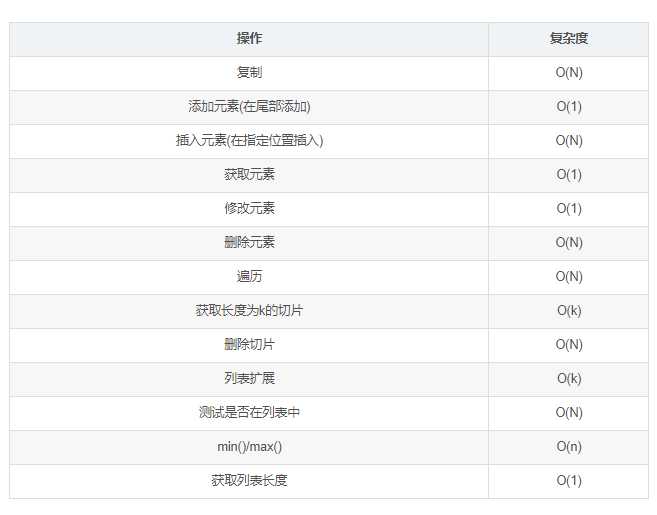标签:turn int app 设置 创建 相等 移动 link node
在python中的顺序表其实就是list。是动态数组(Cpython)。
从细节上看,Python中的列表是由对其它对象的引用组成的连续数组。指向这个数组的指针及其长度被保存在一个列表头结构中。这意味着,每次添加或删除一个元素时,由引用组成的数组需要该标大小(重新分配)。幸运的是,Python在创建这些数组时采用了指数分配,所以并不是每次操作都需要改变数组的大小。但是,也因为这个原因添加或取出元素的平摊复杂度较低。

class Node(object): def __init__(self, item): self.elem = item self.next = None #下一个节点的内存地址 class singleLinkList(): def __init__(self): self.__head = None #私有属性 有限范围在此类中。 链表头只存下一个节点的内存地址 def is_empty(self)-> bool: return self.__head is None #is 判断两变量内存地址是否相等 def length(self)-> int: if self.is_empty(): return 0 count = 0 cur = self.__head while cur is not self.__head: #while cur cur += 1 cur = cur.next return count def add(self, item): #头插法 node = Node(item) node.next = self.__head self.__head = node def travel(self): if self.is_empty(): return cur = self.__head while cur: print(cur.elem) cur = cur.next def append(self,item): if self.is_empty(): self.add(item) else: cur = self.__head node = Node(item) while cur: cur = cur.next cur=node def insert(self,index:int,item:int): if index <= 0: self.add(item) elif index>self.length()-1: self.append(item) else: cur = self.__head n=1 while cur.next: if n==index: break n += 1 cur = cur.next node = Node(item) node.next = cur.next # 被插节点next 赋给 node‘s next cur.next = node # 被插节点的next 指向 node def remove(self,item): if self.is_empty: # 节点为空的情况 raise ValueError("null") cur = self.__head pre = None if self.item == item: self.__head = cur.next while cur.next: pre=cur cur=cur.next if cur.item == item: pre.next = cur.next
class Node(): def __init__(self, item): self.item = item self.next = None # 单向循环链表 class SingleLink(): def __init__(self): self.__head = None def is_empty(self): return self.__head is None def length(self): if self.is_empty(): return 0 n = 1 cur = self.__head while cur.next != self.__head: cur = cur.next n += 1 return n def travel(self): if self.is_empty(): return False cur = self.__head while cur.next != self.__head: print(cur.item) cur = cur.next def add(self, item): """首插法 """ node = Node(item) if self.is_empty(): self.__head = node node.next = self.__head else: cur = self.__head node.next = self.__head # 插入节点先指向head while cur.next != self.__head: cur = cur.next cur.next = node self.__head = node def append(self, item): """尾插法 """ node = Node(item) if self.is_empty(): self.__head = node node.next = self._head else: cur = self.__head while cur.next != self.__head: cur = cur.next cur.next = node node.next = self.__head def insert(self, pos, item): """ 插入节点 :param pos item: :return: """ if pos < 0: self.add(item) elif pos > (self.length()-1): self.append(item) else: node = Node(item) cur = self.__head n = 1 while n != pos: cur = cur.next n += 1 node.next = cur.next cur.next = node def remove(self, item): """ 删除节点 :param item: :return: """ if self.is_empty(): return cur = self.__head pre = None if cur.item == item: # 如果链表不止一个节点 if cur.next != self._head: # 先找到尾节点,将尾节点的next指向第二个节点 while cur.next != self._head: cur = cur.next # cur 指向了尾节点 cur.next = self._head.next self._head = self._head.next else: # 链表只有一个节点 self._head = None # 头节点不是要删除的元素 else: pre = self._head while cur.next != self._head: # 找到了要删除的元素 if cur.item == item: pre.next = cur.next return else: pre = cur cur = cur.next # 尾节点操作 if cur.item == item: #尾部删除 pre.next = cur.next def search(self, item): """查找节点是否存在""" if self.is_empty(): return False cur = self.__head if cur.item == item: return True while cur.next != self.__head: cur = cur.next if cur.item == item: return True return False
class Node(): def __init__(self, item): self.item = item self.prev =None self.next = None class DLinkList(object): """双向链表""" def __init__(self): self.__head = None def is_empty(self): """判断链表是否为空""" return self.__head is None def length(self): """返回链表的长度""" cur = self.__head count = 0 while cur != None: count += 1 cur = cur.next return count def travel(self): """遍历链表""" cur = self.__head while cur != None: print(cur.item) cur = cur.next print("") def add(self, item): """头插法""" node = Node(item) if self.is_empty(): self.__head = node else: node.next = self.__head self.__head.prev = node self.__head = node def append(self, item): """尾部插入元素""" node = Node(item) if self.is_empty(): # 如果是空链表,将_head指向node self._head = node else: # 移动到链表尾部 cur = self._head while cur.next != None: cur = cur.next # 将尾节点cur的next指向node cur.next = node # 将node的prev指向cur node.prev = cur def search(self, item): """查找元素是否存在""" cur = self._head while cur != None: if cur.item == item: return True cur = cur.next return False def insert(self, pos, item): """在指定位置添加节点""" if pos <= 0: self.add(item) elif pos > (self.length() - 1): self.append(item) else: node = Node(item) cur = self._head count = 0 # 移动到指定位置的前一个位置 while count < (pos - 1): count += 1 cur = cur.next # 操作流程为顺时针1234 # 1.将node的prev指向cur node.prev = cur # 2.将node的next指向cur的下一个节点 node.next = cur.next # 3.将cur的下一个节点的prev指向node cur.next.prev = node # 4.将cur的next指向node cur.next = node def remove(self, item): """删除元素""" if self.is_empty(): return else: cur = self._head # 如果首节点的元素就是要删除的元素 if cur.item == item: # 如果链表只有这一个节点 if cur.next == None: self._head = None else: # 将第二个个节点的prev设置为None cur.next.prev = None # 将_head指向第二个节点 self._head = cur.next return # 首节点不是要删除的节点 while cur != None: if cur.item == item: # 将cur的前一个节点的next指向cur的后一个节点 cur.prev.next = cur.next # 将cur的后一个节点的prev指向cur的前一个节点 cur.next.prev = cur.prev break cur = cur.next # 尾结点删除
标签:turn int app 设置 创建 相等 移动 link node
原文地址:https://www.cnblogs.com/sometingintheway/p/11915233.html